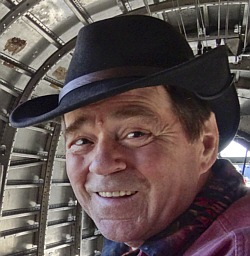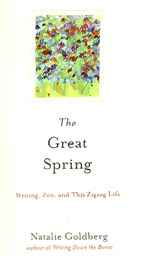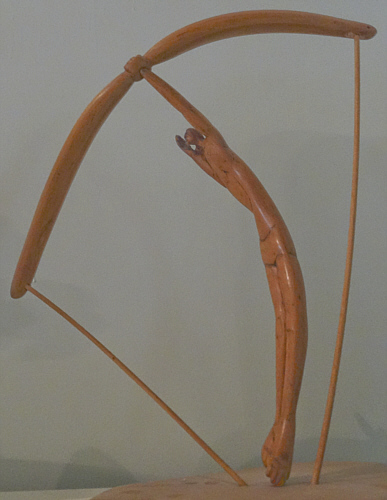The metaphor of an archer for a writer seems fitting for me. Around 1981 I bought a wood
sculpture of an archer which is my favorite. Writing about Archer City, my wood sculpture came
to mind. The archer in the wood carving is holding the bow string taut with his own body which acts
as the arrow! A writer creates the tension in his words, shapes himself into a story, and launches
himself in the direction of his intended reader. My wood sculpture is a fitting symbol for Archer
City.
This book I am reviewing is a First Edition, but I have already glyphed the date in it, written
where I bought it, and have written numerous marginalia inside it. In my early days, I underlined
important passages, but I switched to writing notes in the margins because the underlines
became distracting as I re-read the book for my reviews and research later on. I own few rare books
because they are meant to be looked at and admired, not to be consumed by this hungry reader. I decline
offers from friends who want to loan me a book, "Sorry, but if I read your book, as hard as I try to
avoid it, I will make notes inside it." I buy books I choose to read. Kindles to me are only useful as
night lights if you have no other source of light.
My parents hardly read my writing. Once my father asked me if I would write a poem about
the small sawmill town of Donner in which my mom grew up. What can I write about a sawmill
town, I thought, but Dad was interested in my writing and knew that I could write poems, so I
needed to produce a poem which somehow summarized my mom's life in this now-gone sawmill
town. Like cypress kindling, Donner flamed up in the early 20th century and was snuffled out when
the old growth Bald Cypress were clear-cut by 1938. That led Annette to move to Bourg where she met Buster
and they became my parents a couple of years later. I basically came into being because of Donner, one
might say I came through the sawmill town of Donner, a sawmill town that was through now. Those
words in italics became the title and theme of my poem which you can read here: Donner. Years
later, Dad asked me one day out of the blue (we rarely talked about my work as a writer), "Is writing
hard?" Boy, that was a hard question to answer, but I thought about it and came up with this reply,
"No, Dad, writing is easy; it's having something worth writing about that is hard."
When I made a decision to spend the rest of my life writing, I had no idea where to begin. Up
until that time, I wrote when I was given assignments to write. I wrote several articles in national
journals, such as Datamation Magazine, Journal of Irreproducible Results, and International
Transactional Analysis Association Journal, among other small journals, but nothing that filled my
time and I struggled to find myself as a writer. Into this vacuum strolled a man named Peter Elbow.
What a perfect name for a writing teacher! And his book was perfect for me, Writing
Without Teachers. I bought a copy immediately and began writing following his instructions. "Take
out a piece of paper and write for ten minutes without stopping". WOW! How simple is that? I
thought. Write without stopping until you have filled ten minutes of time, which amounts to two
pages at my speed of writing. If you can't think of anything to say, write "I can't think of anything
to say." The main job is to keep writing, to write through the pauses even.
Soon, the editor in my head simply GAVE UP! I kept writing so the editor got pissed and left
me alone to my foolishness, as he called it. My writing began to make sense and led me into an
occupation as writer. I had already made the decision, but I had a family to house, feed, and
entertain, so I took a job at a nuclear power plant. I was driving to work for 90 minutes each way,
which gave me about an hour and a half of time for reading each day. I taught myself to drive safely
while reading, and one day I finished reading a book while on my way to work. During my coffee break, I got ready to do the daily Free-Writing Exercise suggested by Peter Elbow and my feelings perked up as I thought, “CONTENT!” What I felt was relief that today’s writing exercise already had content ready to fill the two empty pages, namely, writing about the book I had just finished reading! That is how I began my practice
of writing a review of every book after I finish reading it.
When Natalie said that she avoided doing writing workshops, I understood what she meant as
I had avoided them in my own career. I did start a brief Writing Without Teachers class for a half
dozen friends which helped them and me get this process started, but no writing workshops or
classes after that for me.
[page 71] It is widely acknowledged that writing cannot be taught as a
chronological step-by-step method and that this workshopping process, we
were doing in class, is the way writing is transmitted in America. Many great
writers have been initiated this way. But I grew impatient. I have assiduously
avoided workshopping for the whole of my writing career.
Natalie described what happened when she sent a friend directions to a newly built retreat in
Taos. What her friend discovered was that we get lost in maps we create out of the words people
use to give us directions. My preference is always a sketchy map over an elaborate verbal
description of the route, and her friend describes my very reason for the map preference.
[page 144] "I rented a car at the airport in Albuquerque. Getting to Taos was
fine — only one highway pointing north — but then I had to follow Natalie's
directions on these dirt back roads. I got lost. I realize now that when I listened
to her over the phone, I pictured in my mind what she was saying, and when
the markers appear in actuality — for instance, the right at an abandoned
adobe — they weren't how I'd pictured them, so I ignored them and went
looking for what matched my vision. Isn't that how we also work in our life?
We don't see reality."
As a 35-year-old, my supervisor told me, "In the Norwegian Boy Scout Handbook, in the
section on Map Reading, it said, 'When the terrain differs from the map, believe the terrain."
Natalie drove to Hibbing, Minnesota with Mary, a filmmaker, to find Bob Dylan, but instead found
Bobby Zimmerman. But along the way they couldn't find Bob Dylan and became tangled up in
attempting to find Dylan and made a movie about their process of looking for him, named Tangled
Up in Bob. Mary said she knew they had a movie after they met BJ Rolfzen, Dylan's English
teacher.
[page 150, 151] We traveled back to Hibbing several more times and made the
film Tangled Up in Bob. At the end I realized I couldn't find Bob Dylan, the
man I played on my stereo, in Hibbing. What I found in Hibbing was Bobby
Zimmerman, who eventually gave birth to Bob Dylan. Hibbing was where he
came from but he left and went on to another life. . . . The film turned out
gorgeous, and something large and unexpected happened to me in the process.
I went up to Hibbing hoping to find home — Dylan's, mine, somebody's. But
you can't find a home in a house, a building, a place. Instead I found
friendship, with the breath of poetry breathing us, both BJ and me.
In the Chapter called Losing, Natalie loses friends in six stories. Sandy was one.
[page 154] "Do you see that bird's nest on top of the telephone pole?" He
I'd have to squint hard. "Yes, you're right. Wow."
He was clear almost to the end. I'd stop by, bring watermelon — his
favorite — out of season, while he was propped up in bed reading the New York
Times.
Gone now. A rush of death in a month's time.
A friend of mine gave me this advice decades ago — he's probably dead now. "If you live long
enough, all your relatives and friends will die — keep getting younger friends."
Stories and more stories, Chinese in St. Paul, Zen at the High Chapperal, and at the end, a
memorable Afterword titled The Smoke of Memories. I like to think of it as a poem with which
Natalie ends the Great Spring with a Lingering Summer:
Afterword
After word
there's only
the smoke
of memories.
~^~
Any questions about this review, Contact: Bobby Matherne
~~~~~~~~~~~~~~~~~~~~~~~~~~~~~~~~~~~~~~~~~~~~~~~~~~~~~~~~~~

 == == == == == == == == == == == == == == == ==
== == == == == == == == == == == == == == == ==
22+ Million Good Readers have Liked Us
22,454,155
as of November 7, 2019
Mo-to-Date Daily Ave 5,528
Readers
For Monthly DIGESTWORLD Email Reminder:
Subscribe! You'll Like Us, Too!
== == == == == == == == == == == == == == == ==
Click Left Photo for List of All ARJ2 Reviews Click Right Bookcover for Next Review in List
Did you Enjoy this Webpage?
Subscribe to the Good Mountain Press Digest: Click Here!


CLICK ON FLAGS TO OPEN OUR FIRST-AID KIT.
All the tools you need for a simple Speed Trace IN ONE PLACE. Do you feel like you're swimming against a strong current in your life? Are you fearful? Are you seeing red? Very angry? Anxious? Feel down or upset by everyday occurrences? Plagued by chronic discomforts like migraine headaches? Have seasickness on cruises? Have butterflies when you get up to speak? Learn to use this simple 21st Century memory technique. Remove these unwanted physical body states, and even more, without surgery, drugs, or psychotherapy, and best of all: without charge to you.
Simply CLICK AND OPEN the
FIRST-AID KIT.

Counselor? Visit the Counselor's Corner for Suggestions on Incorporating Doyletics in Your Work.

All material on this webpage Copyright 2019 by Bobby Matherne
![Click to return to ARJ Page, File Photo of Natalie Goldberg [ or from [Credits for source of photo]]](http://www.doyletics.com/arj/greataut.jpg)





